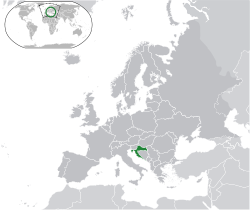Croatia Is In Running For EU Membership, But Croatians? – Analysis
By JTW
By Muzaffer Kutlay
The European Commission, in the document pertaining to the Enlargement Strategy announced on October 12, reported that Croatia is ready to participate in the EU composed of 27 countries. Croatia, which completed the accession negotiations in June 2011 by fulfilling all the topics, is expected to sign the accession treaty after the EU summit to be held in December. Within one month after the signing of the agreement, the Croatian people will go to the polls for a referendum on the issue of membership.
This process has been perceived in a very positive by politicians and the ruling elite, while being received quite suspiciously by the public. As a matter of fact, since the EU carries a serious burden of debt and passes on the hard times because of the economic crisis surrounding the euro zone, under these circumstances it has come into question as to how the EU can provide prosperity to Croatia while struggling with a high current account deficit, external debt ratios, and the unemployment that reaches 20 percent. Moreover, listening to the positive aspects of EU membership from politicians constantly referred to in allegations of corruption and the use of self-interest loans provided by the EU naturally creates crucial doubts among the public.

As shown by recent public opinion polls carried out in the country, the anti-EU segment of the population has been gathering new supporters with every passing day. According to the results of the survey released in September, 40 percent of Croats do not want to join the EU. The survey has indicated that 7 percent of Croats are undecided. The proponents of the EU, whose rates have fallen considerably when compared to the previous year, comprise the remaining portion, i.e. 53 percent.
The political parties of Croatia also seem divided about EU membership. Inasmuch as, although in Croatia the parliamentary elections will be held on December 4, many parties’ most important election slogans reference the EU membership issue. Some parties will spend time to show that EU membership is not a “sweet dream” as previously thought. That the leader of the right-wing Croatian Party of Rights (HSP), Danijel Srb, said in his speech in regard to the upcoming elections, “We hope to have enough time to convince voters about the rejection of membership in the EU” is quite revealing.
On the other hand, when looking at the overall atmosphere in the country and voters’ behavior, the main expectation of the people from the politicians is to see concrete steps taken toward the solution of problems faced in daily life come to the fore. However, many of the politicians speak only on EU membership and allegations of corruption directed against each other throughout the campaign. In particular, in regard to issues such as combating unemployment and the economic crisis, a politician who appears with a comprehensive project and precaution packages has not been seen. This situation causes hesitation in the public about whether or not to vote in the election. Young voters in particular indicate that they will “think carefully” and then vote in the elections by complaining about how the economic crisis and unemployment issues are not on the agenda of politicians.
With a period of less than one month remaining until the elections in Croatia, it is hard to say who will win through the struggle of power. However, the politicians’ work is not easy in both convincing the public and concluding the competition of “who is more corrupt.” According to political analysts in the country, the participation rate in the elections of the people who have lost their confidence in politicians could be much lower. This case illustrates a significant crack in the democracy of a country that stands on the brink of EU membership. In summary, the current conjuncture shows that in Croatia, where the elections will be held twice in the forthcoming period, maybe much more than the numbers of voters participating in the parliamentary elections will be running to the polls for the EU membership referendum to say “No.”
Muzaffer Kutlay
USAK Center for EU Studies
